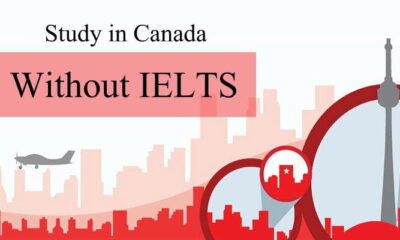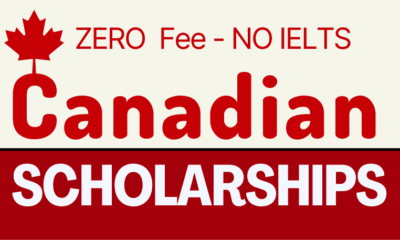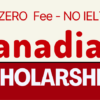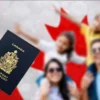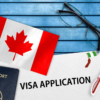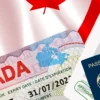Study in Canada
Entry Requirements for International Students in Canada
Canada, in recent years, has become one of the foremost destinations in the world for immigration for many beautiful reasons, one of which is its education sector. And education in Canada is among the best regarding standard, quality, and tuition. Many people, therefore, fancy education in Canada compared to other countries.
The Canadian universities’ entry requirements for international students are also one of the best and most straightforward, which is another reason Canadian Universities are preferred is that they consistently rank as some of the best in the world.
That is in conjunction with Canada’s acceptance and love for diversity, making it a foreign destination’s first choice regarding education. Also, this is not leaving out its living condition, which stands as one of the best worldwide, and the availability of good and choice employment opportunities after studies.

Why Choose Canada?
In pursuing your academic dream, where you choose to be educated is just as important as the price you pay for the education. Therefore, in your desire for an undergraduate, graduate, or postgraduate degree, a liking for the multicultural environment, or internationally recognized and ranked universities and colleges, Canada is an ideal education destination for international students like you.
Moreso, you can consider many study options in Canadian universities and colleges, technical and professional schools, and applied arts and science institutions.
Why should you choose Canada? It is no gainsaying that more than 30 Canadian universities are ranked among the best and top 300 global universities in the world, according to rankings by Times Higher Education, Shanghai University, and QS Rankings.
This goes a long way to reiterate Canadian higher education’s overall quality and standard.
Canadian Universities Entry Requirements For International Students
Every university generally has requirements and eligibility criteria for admitting students into their faculties and schools. Nevertheless, there are generally accepted criteria that apply to universities in Canada. These are;
- You must have completed and obtained a graduate certificate or diploma from a recognized university.
- Submitted a filled application form
- Submitted a good letter of intent
- Have a good resume or CV for graduate and postgraduate studies
- You must show proof and evidence of financial sufficiency to sponsor your program and support yourself throughout your study period in Canada.
- You must meet and provide proof of the language proficiency requirements (English or French)
- Have valid and up-to-date academic documents (including transcripts)
- Obtained a study visa
Based on the study level, the requirements are pretty different. For example, an undergraduate requirement for admission differs from a graduate, and a graduate differs from a postgraduate study.
For Undergraduate Study- Canadian Universities Entry Requirements
The primary academic requirement for an undergraduate/bachelor’s degree program are:
- You must make at least 70% in 12th grade to be qualified for further undergraduate study.
- You should pass your TOEFL exam with PBT: 580-600 min. (dependent upon your course type).
- Your computer-based test (CBT) minimum score should be 237-250 min. (depends upon your course type)
- Your 12th-grade level Mathematics is a must to pass to qualify you for further academic pursuit at the undergraduate level.
For Bachelor’s/Diploma and Certificate Programs- Canadian Universities Entry Requirements
- Admission to these is pretty flexible, and requirements depend on the institution.
- Your language proficiency test (IELTS) score must be; 6 / 6.5 overall, per the course and institution requirements.
- Also, your TOEFL score must be a minimum of PBT: 550 min.
- Computer-based test scores must be CBT: 213 minimum.
For Master’s and Post-Graduate Programs – Canadian Universities Entry Requirements
- Suppose you are above 25 years old by the time of your application and have completed an undergraduate or diploma degree or certificate. In that case, you must provide proof of at least 2-3 years of full-time work experience.
- Have a GMAT score of 580-600 min.
- Provide an IELTS score of: 6.5 overall with no bands less than 6 / As per the course and institution requirements.
- You must have a TOEFL score of PBT: 580-600 min. (dependent upon your course type).
- Have a CBT score of 237-250 min. (depends upon the course type).
- Must have completed a 4 yr Bachelors’s degree and made not less than 70% average.
- Some institutions may require you to submit a written sample or copies of your published work/Portfolio.
Language Proficiency Requirements for International Students
Language is the primary form of communication between people. Without it, there will be no understanding of intent and what is meant to be communicated. For this reason, language becomes a primary criterion for eligibility into any Canadian University.
Understanding the language in which academic study is taught provides a level playing ground for all students in Canada. Thus, it is required that, as a prospective student, you are proficient in the language in which your academic work will be taught.
The Major English Language Proficiency Test Accepted by Top Universities in Canada includes:
- IELTS Academic
- PTE Academic
- C1 Advanced
- TOEFL iBT
Some other universities may accept English tests from the following:
- CAEL (Canadian Academic English Language Assessment)
- CanTEST (Canadian Test of English for Scholars and Trainees)
- MELAB (Michigan English Language Assessment Battery)
French language test accepted by Canadian universities includes the following:
- Diplôme approfondi de langue française (DALF) Advanced diploma in French language.
- Test de français international (TFI)
- Diplôme d’études en langue française (DELF) Diploma of French-language studies.
- The Test d’Évaluation de Français (TEF)
- Test de Connaissance du Français (TCF)
- Test d’Evaluation du français adapté pour le Québec (TEFAQ)
- TestCan
Knowing the Intakes and Deadlines for Canadian Universities
Intakes in Canada refer to semesters. Unlike in some other countries where there is only one primary intake per year, universities in Canada have three intakes or semesters in which new students are admitted. These are:
- Fall Intake: This is one of the most popular intakes to which students prefer to be admitted. The Fall intake begins in September.
- Winter Intake: This starts in January and is the next intake available should you miss the Fall intake
- Summer Intake: Summer intakes begins in April and May. This is popularly compared to the other intakes and is only available for specific programs and courses and to some colleges.
Below is a general calendar for available intakes for universities and colleges across Canada
Program Intake Deadline
Undergraduate and postgraduate
- University Fall – September
- Winter – January, December – March
- September – November
Diploma programs in colleges
- January – May
- August/September August – September
- January – February
- February – April
You might want to decide on the best intake to go for. However, this will be dependent on certain factors, which might include;
- When you can put your academic records together
- Availability and start of your desired program
- When you get your entry, examine the test scores
- The acceptance rate into the program of choice
- Employment opportunities
- Your financial readiness and general willingness to begin
Note: International students applying to study in Canada have opportunities to apply in two enrollment sessions;
- Winter session: The application deadline for winter enrolment ends on the 1st of September.
- Summer enrollments begin on the 15th of January for Master’s students but earlier for undergraduate students.
Universities and College institutions have different deadlines. Also, various degree programs at the same university or college may have other deadlines. This is why it is vital for you to always check the official website of the study program you are applying to for up-to-date information.
Furthermore, to increase your chances of being accepted, you must submit your application at least 8 to 12 months before the start date of your program. When this is done, you will receive an official letter of acceptance from the university or college, not more than one or two months after applications have closed.
Step By Step Guide To Application As An International Student
- Ensure you understand the requirements
- Know the right university appropriate for you and choose your program
- Take the language proficiency tests as applicable to your desired language
- Apply to at least three different universities; select your first choice and the others as backups
- Apply for your study permit
What To Do Next After Meeting All Application Requirements
These are what to do after meeting Canadian Universities entry requirements:
- You will have to get your health insurance. This is very important as the requirement enables you to get your travel visa. However, the amount covered is determined by the Canadian province where you will live.
- Canadian study permit (Canada student visa); The Canadian Study Visa allows you to enter Canada as an international student. You must obtain it before the start of your program, so you must apply as soon as possible after receiving your acceptance letter, without which you will not be allowed to enter the country. Also, some countries, especially the European Union (EU), do not require a student visa to study in Canada. It is, therefore, necessary to know if your country is on that list.
- You should not be in a hurry to buy a plane ticket to Canada unless you have only received your visa confirmation.
- Upon arriving in Canada, you must officially enroll in person at the university to confirm that you will start your classes.
What are the Possibilities of a Student in Canada?
The possibilities are numerous as the Canadian government highly regards international students as possible permanent residents. This is because they often speak multiple languages, have Canadian work experience, understand the culture and diverse terrain, are young and vibrant, and have highly coveted Canadian qualifications.
Canada’s Post-Graduation Work Permit allows international students to begin their careers in Canada after graduation.
Also, new changes and improvements to the Express Entry selection system make it easier for international students to transition to permanent residents.
FAQs
How can I enroll in a Canadian university?
International students must possess a high school diploma, a bachelor’s degree, or a master’s degree from an accredited institution to be accepted into a Canadian university.
Applicants to Canadian institutions must typically have a GPA of 2.5 to 3.0 on a 4.0 scale (77 to 86%). To enroll, a Canada Student Visa is also required.
Is free admission an option in Canada?
Indeed, there are scholarships and grant programs that can cover tuition costs and living expenses, making it feasible for students to enroll in Canadian universities without paying anything.
Can I study in Canada if my GPA is 2.5?
For most Canadian universities, a minimum GPA of 3.0 out of 4.0 is needed to be eligible for a Master’s degree. Many universities, nevertheless, will accept GPAs as low as 2.0. However, it depends on the college and the curriculum.
Which Canadian university welcomes the most international students?
Every year, McGill University enrolls thousands of international students from more than 150 nations. It has the highest proportion of Ph.D. students of any research university in Canada.






